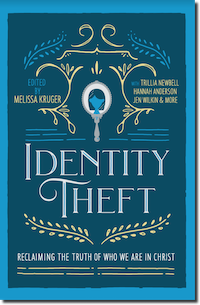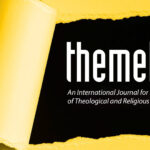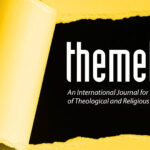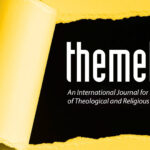The new August 2021 issue of Themelios has 226 pages of editorials, articles, and book reviews. It is freely available in three formats: (1) PDF, (2) web version, and (3) Logos Bible Software.
1. D. A. Carson | A Biblical Theology of Education
Carson examines what the Bible says about education, briefly surveys a handful of historical examples, then explores the peculiar challenges of putting these pieces together at the beginning of the 21st century, in the Western world.
2. Daniel Strange | No Longer Humans, but Angels (and Demons)
Strange reflects on the theme of “disappointment,” arguing that while “life under the sun” may feel like one disappointment after another, life in the Son is the opposite. Jesus Christ is the One who never disappoints and whose blessings never disappoint.
3. Cory Barnes | Testimonies of Faith and Fear: Canaanite Responses to YHWH’s Work in Joshua
Barnes surveys five passages from Joshua in which Canaanites hear of YHWH’s works on Israel’s behalf and respond accordingly (Josh 2:10–11; 9:1–2; 9:3, 9; 10:1–2; 11:1). This analysis provides insight into the theology of the book of Joshua and informs our theological method for interpreting the OT.
4. Justin Jackson | The Bows of the Mighty Are Broken: The “Fall” of the Proud and the Exaltation of the Humble in 1 Samuel
Jackson demonstrates 1 Samuel’s literary unity by highlighting the great reversal motif as the arrogant “fall” and the humble are lifted up. The book’s unified theological message is that God humbles the self-exalting and exalts the humble, thereby proving his sovereignty and his plan to raise up a humble prince to reign over God’s people.
5. Douglas S. Huffman | A Two-Dimensional Taxonomy of Forms for the NT Use of the OT
The field of the New Testament’s use of the Old Testament is encumbered with ambiguous definitions for key terms like quotation, allusion, and echo. Huffman refines these the labels and definitions and also recommends a two-dimensional taxonomy that visually portrays the overlapping relationships of these various form classifications.
6. Joshua Maurer and Ty Kieser | Jesus, “Adopted Son of God”? Romans 1:4, Orthodox Christology, and Concerns about a Contemporary Conclusion
Maurer and Kieser respond to recent evangelical theologians who claim that Christ was “adopted” by God, based on Romans 1:4. They argue that affirming Jesus’s adoption by God rests upon unwarranted soteriological premises, implies unwanted christological implications, and is exegetically unnecessary. Ultimately, the good news of our adoption is rooted in the immutable foundation of Christ’s eternal Sonship.
7. Jeremy Kimble | Exclusion from the People of God: An Examination of Paul’s Use of the Old Testament in 1 Corinthians 5
Kimble examines Paul’s use of Deuteronomy in 1 Corinthians 5:13 and concludes that this apostolic rebuke reveals an eschatological trajectory for excommunication, which, as a present judgment by the church, serves as a declarative sign toward the future judgment of God.
8. Florenc Mene | Diognetus and the Parting of the Ways
Mene explores four features of the second-century Letter to Diognetus that reveal the author’s attitude regarding Jewish-Christian relations at that time. He concludes that Diognetus reflects a historical situation where Jews and Christians were viewed as separate entities.
9. Dennis Greeson | Beginning at the End of All Things: Abraham Kuyper’s and Klaas Schilder’s Eschatological Visions of Culture
Greeson wades into the debates over Abraham Kuyper’s hallmark doctrine of common grace by revisiting the work of Klaas Schilder, one of Kuyper’s most vocal critics. While the divide between Kuyper and Schilder has historically been severe, this article highlights similarities regarding their eschatological vision of Christian cultural creation, which offers a way to harmonize their differences.
10. Hans Madueme and Robert Erle Barham | Stories that Gleam like Lightning: The Outrageous Idea of Christian Fiction
We live our faith “in a condition of doubt and uncertainty,” writes Charles Taylor, and Madueme and Barham argue that much contemporary fiction conforms to Taylor’s concept of secularity. They call for an unapologetically Christian fiction that has the potential to transform the imagination and remind us that this world is a theater bursting with God’s glory.
11. Robert P. Menzies | A Tale of Two Stories: Amos Yong’s Mission after Pentecost and T’ien Ju-K’ang’s Peaks of Faith
Menzies contrasts two books on missiology: Amos Yong’s Mission after Pentecost and T’ien Ju-K’ang’s Peaks of Faith. Mission after Pentecost dismisses the urgency of verbal witness, the significance of eschatological judgment, and the need for conversion, while concluding that the modern missions movement is dead. Alternatively, Peaks of Faith recounts the powerful impact of the gospel in Southwest China, offering a radically different account of missions from the caricature produced by Yong’s post-colonial critique.
12. Kevin DeYoung | The Making of Biblical Womanhood: A Review
Beth Allison Barr’s The Making of Biblical Womanhood sets out to demonstrate the historical roots of “biblical womanhood,” a system of Christian patriarchy that is not really Christian. DeYoung’s review article poses two key questions, both of which point to significant weaknesses in Barr’s argument as a historian: (1) Does Barr deal fairly and accurately with the proponents of “biblical womanhood”? (2) Does Barr deal fairly and accurately with the historical evidence she cites in opposition to “biblical womanhood”? Specific examples of historical half-truths reveal a more comprehensive problem with Barr’s methodology.
Featured Book Reviews:
- Michael Morales, Exodus Old and New: A Biblical Theology of Redemption. Reviewed by Drew N. Grumbles
- Gary M. Burge, The New Testament in Seven Sentences: A Small Introduction to a Vast Topic. Reviewed by John J. H. Lee
- Thomas R. Schreiner, Handbook on Acts and Paul’s Letters. Reviewed by Hefin J. Jones
- Jason G. Duesing and Nathan A. Finn, Historical Theology for the Church. Reviewed by Jonathon D. Woodyard
- Patrick Schreiner, The Ascension of Christ: Recovering a Neglected Doctrine. Reviewed by David Rathel
- Paul David Tripp, Lead: 12 Gospel Principles for Leadership in the Church. Reviewed by Jeremy Kimble
- Thaddeus J. Williams, Confronting Injustice Without Compromising Truth: 12 Questions Christians Should Ask about Social Justice. Reviewed by Neil Shenvi
- Duane Alexander Miller, Two Stories of Everything: The Competing Metanarratives of Islam and Christianity. Reviewed by Matthew Bennett
Get Your FREE eBook: ‘Identity Theft’, edited by Melissa Kruger

Do you ever wrestle with the gap between what you believe and how you live? Do you feel discouraged when comparing your faith to others? Do you struggle to believe God would really love fickle-hearted people?
We all do, which is why TGC wants to send you a FREE digital copy of Identity Theft: Reclaiming the Truth of Who We Are in Christ.
Ready to be encouraged? Tell us where to send your copy of Identity Theft using the link below.


































